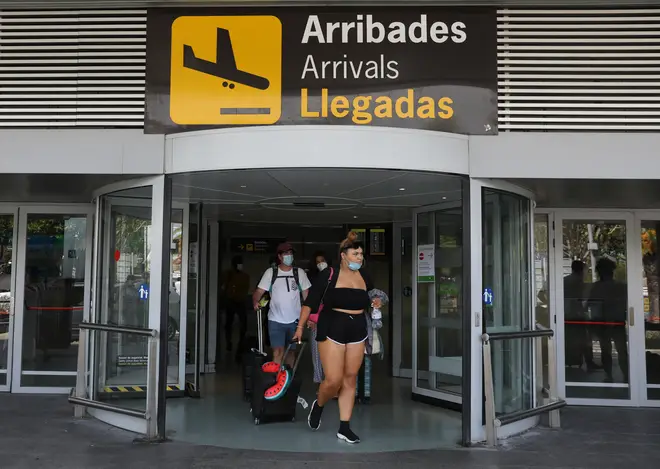
Ian Payne 4am - 7am
22 March 2021, 17:30 | Updated: 22 March 2021, 17:48

People who leave the UK without a reasonable excuse will face fines of up to £5,000, but outdoor protests will be explicitly permitted again, under new laws which into force next week.
The new legislation outlines the legal basis for restrictions in England over the coming months, putting into law Boris Johnson's roadmap for coming out of lockdown.
The measures will be voted on in Parliament on Thursday and are expected to come into force on 29 March.
They will expire on 30 June, unless they are scrapped or amended in the meantime, however they must also undergo a review every 35 days.
In a hit to those hoping for a summer holiday abroad, among the rules are a restriction on leaving the UK without a reasonable excuse, with those breaking them risking a fine of £5,000.
Read more: Will Brits be able to go on foreign trips? LBC asks a Government Minister
Watch: Caller says he'll only take the Covid jab to go on holiday

Will Brits be able to go on foreign summer holidays?
The law says people must not "leave England to travel to a destination outside the United Kingdom, or travel to, or be present at, an embarkation point for the purpose of travelling from there to a destination outside the United Kingdom" without a reasonable excuse.
These include work, studying, elite sports, medical reasons, care and assistance to a vulnerable person or a wedding of a close family member.
There is also a £200 fixed penalty notice for failing to fill in a travel declaration form - giving personal details and a reason for travel - for those planning to leave the UK.
While travelling abroad for a holiday was already illegal under stay at home rules, the new laws make this explicit.
Read more: Government struggling to defend six-month extension to lockdown powers
Read more: EU introduces ‘vaccine passports’ ahead of summer holidays

Boris Johnson defends border measures after Brazilian variant imported
On Monday, Labour called for the government to go further and implement stricter rules on those entering the country.
Shadow Home Secretary Nick Thomas-Synmonds said: “It’s unacceptable that only one percent of international arrivals quarantine in a hotel.
"We need a comprehensive hotel quarantine system now, to help protect against a third wave and to safeguard the vaccine rollout.
"Ministers will only have themselves to blame if they do not act now.”
Read more: Boris Johnson warns UK will 'feel the effects' of Covid third wave

Boris Johnson says the UK will 'feel effects' of a third wave
The government have said they will reveal more details on when international travel will be permitted for leisure in the middle of April.
However, on Saturday, Professor Mike Tildesley, who advises the government as a member of SAGE, told LBC the chance of a having a holiday abroad is "extremely unlikely" following a surge in covid cases in Europe.
“The concern is of course what happens in the summer with international travel. We run the risk of potentially bringing more of these new variants into the country," he explained.
“And if it starts to spread more rapidly and the vaccines are less effective then we really have serious problems going forward."
Explained: What rules will Brits face in European summer destinations?
Read more: 'You're not prepared to answer': Nick Ferrari clashes with minister over lockdown power extension

Nick Ferrari challenges the Care Minister over emergency Covid powers
While the rules on international travel are being tightened in the new legislation, socially distanced outdoor protests will be explicitly permitted from 29 March.
Currently there is no explicit exemption to the rules for protests, with police saying they felt the rules were unclear for both officers and the public.
The new legislation appears to placate this, stating that protests which abide by Covid precautions and are "organised by a business, a charitable, benevolent or philanthropic institution, a public body or a political body", will be permitted.